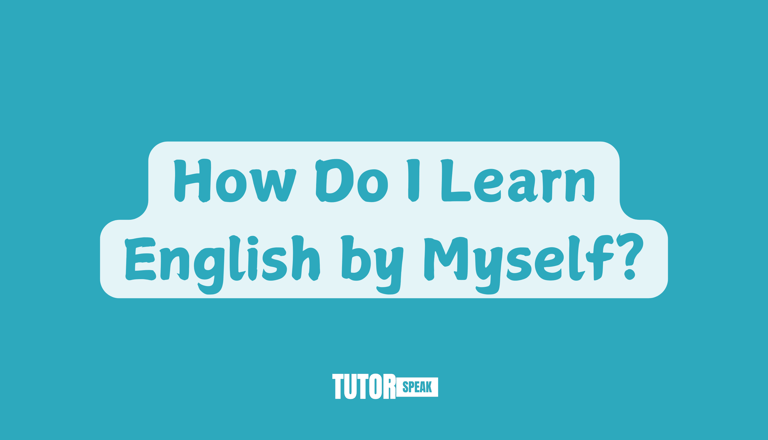How Do I Learn English by Myself?
How Do I Learn English by Myself? Discover proven self-study tips, tools, and techniques to master English language at your own pace without needing formal classes.
TutorSpeak
4 min read


How Do I Learn English by Myself?
Learning English by yourself is entirely possible and can be incredibly rewarding. Whether you're doing it to travel, improve your career, pass an exam, or simply for personal growth, self-study offers flexibility and control over your learning pace. In this guide, you'll discover effective strategies, tools, and tips to help you become confident and fluent in English without needing to attend formal classes.
1. Set Clear Goals for Your English Learning
1.1 Why Are You Learning English?
Before diving into learning, define your purpose. Are you learning English for work, travel, academic purposes, or social interaction? Your goals will influence your study methods and the vocabulary you focus on.
1.2 Break Down Your Goals
Set SMART goals—Specific, Measurable, Achievable, Relevant, and Time-bound. For example: "Learn 20 new English words a week" or "Watch one English movie every weekend without subtitles."
2. Build a Study Routine That Works
2.1 Daily Practice Is Key
Consistency beats intensity. Even 15 to 30 minutes a day can be more effective than studying for hours once a week. Create a routine that fits your lifestyle—early morning reviews, lunch break vocabulary, or evening grammar practice.
2.2 Use a Study Schedule
Organize your week to include different English skills:
Monday: Vocabulary
Tuesday: Listening
Wednesday: Grammar
Thursday: Speaking
Friday: Reading
Saturday: Writing
Sunday: Review & relax with English content
3. Use the Right Tools and Resources
3.1 Online English Courses
Online platforms offer free and paid resources to guide you through your learning path. A great place to start is TutorSpeak’s Free English Course. It provides beginner-friendly content tailored for self-learners.
3.2 English Learning Apps
Apps like Duolingo, Memrise, Anki, and Quizlet are excellent for vocabulary building and spaced repetition. Use them to practice while commuting or during free time.
3.3 English Dictionaries
A good monolingual dictionary (e.g., Oxford Learner’s Dictionary) can help you understand English definitions without always translating back to your native language. This helps you think in English.
4. Practice All Four Language Skills
4.1 Listening
Watch English YouTube channels (like BBC Learning English or VOA Learning English).
Listen to podcasts on Spotify or Apple Podcasts. Choose beginner to intermediate levels first.
Watch Netflix or YouTube with English subtitles.
4.2 Speaking
Talk to yourself in English (e.g., describe your day, practice dialogues).
Use language exchange apps like HelloTalk, Tandem, or Speaky.
Record yourself speaking and compare with native speakers.
4.3 Reading
Start with children’s books or graded readers.
Progress to blogs, news articles, or novels.
Read aloud to improve pronunciation and confidence.
4.4 Writing
Keep a daily English journal.
Write social media posts in English.
Try writing emails or short stories and use grammar checkers like Grammarly to correct mistakes.
5. Surround Yourself with English (Immersion Method)
5.1 Change Your Environment
Set your phone, computer, and apps to English.
Follow English-speaking influencers or educators on social media.
Label household items in English.
5.2 Think in English
Train your brain to process thoughts in English instead of translating. Start by naming objects around you or forming basic sentences in your head.
6. Focus on Vocabulary and Phrases
6.1 Learn Words in Context
Instead of memorizing isolated words, learn phrases and sentences. For example, "make a decision" is more useful than just "decision."
6.2 Use Spaced Repetition Systems (SRS)
Apps like Anki and Memrise help you review words at optimal intervals so you don't forget them.
6.3 Learn the Most Common Words First
Start with the 1000 most common English words. Mastering these can help you understand up to 80% of daily conversations.
7. Use Real-Life Situations to Practice
7.1 Simulate Real Conversations
Order food in English at restaurants (if possible)
Role-play dialogues (job interview, shopping, traveling)
Practice pronunciation using YouGlish to hear native examples of words
7.2 Join Online Communities
Participate in English-speaking forums like Reddit or Quora
Join Facebook groups or Discord servers for English learners
Comment in English on YouTube or Instagram posts
8. Be Patient and Track Your Progress
8.1 Track Your Achievements
Celebrate small wins like learning 10 new words or completing a podcast episode. Use a notebook or app to log your progress.
8.2 Don’t Fear Mistakes
Mistakes are essential to learning. Every error teaches you something. Embrace them and keep going.
9. Use Free and Paid Learning Platforms
9.1 TutorSpeak – Learn for Free
If you're looking for a structured yet flexible course to guide you, try TutorSpeak's Free English Course. It’s beginner-friendly, self-paced, and covers grammar, speaking, listening, and vocabulary.
9.2 Other Useful Resources
BBC Learning English – Great for news-based lessons
EngVid – Free video lessons from experienced English teachers
FutureLearn – Offers academic English courses online
10. Stay Motivated and Consistent
10.1 Set Rewards for Yourself
After reaching a milestone (like completing 30 days of study), reward yourself with a treat.
10.2 Find a Study Buddy or Online Tutor
Having someone to share your journey with can keep you motivated. Even if you study alone, check in with an online teacher from time to time.
Conclusion
Learning English by yourself may seem challenging, but with the right mindset, tools, and strategies, it's absolutely possible. Be consistent, practice every day, and make learning fun. Whether you're learning for travel, career, or personal satisfaction, self-study puts you in control of your journey.
To get started with free, structured lessons, explore TutorSpeak’s Free English Course and begin your journey to fluency today.
Let English become a part of your life, and you’ll be surprised how far you can go!



